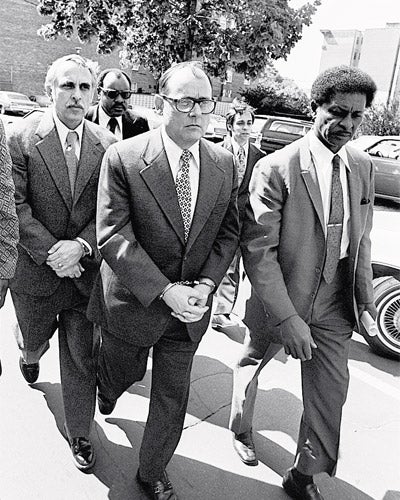Bernard Barker: CIA agent who took part in the Watergate burglary

Burglary – what burglary? That more or less summed up the view of Bernard Barker, Cuban nationalist, bitter foe of Fidel Castro and erstwhile undercover CIA operative, who was caught red-handed while committing the crime that led to the resignation of an American president.
Barker was first recruited by E. Howard Hunt, a former CIA colleague who had become master of dirty tricks for Richard Nixon, to carry out the 1971 break-in at the Los Angeles office of the psychiatrist of Daniel Ellsberg, leaker of the "Pentagon Papers," a secret US government history of the Vietnam war.
A year later Hunt, the head of the so-called White House "Plumbers' Unit" turned to Barker again, this time as one of a five-man team who broke into the Democratic National Committee headquarters in the Watergate building in downtown Washington on the night of 17 June 1972. But a security guard noted that a lock had been tampered with and called the police, who found Barker hiding behind a desk in the DNC office, at 2.30 in the morning, wearing a business suit and surgical gloves, with $5,000 in $100 bills in his pocket.
For the rest of his life, he maintained he had done nothing wrong, only his patriotic duty, as a Cuban and an American. Testifying to the Senate Watergate Committee in 1973, Barker claimed Hunt had told him that the raid was to find proof that Cuba and other countries had made illegal campaign contributions to the Democratic party – something that could pave the way for the "liberation" of his country from Communist rule. "I see no difference between this and being a bombardier in World War II" (in which Barker served as on a B-17 Flying Fortress and spent over a year as a prisoner of war after being shot down over Germany in 1944). But the Watergate judge John Sirica was unimpressed by these arguments and sentenced Barker to up to six years in jail for wiretapping and theft, of which he ultimately served 18 months before being released in July 1975.
Bernard Barker was the son of an American couple living in Havana. Possessing both Cuban and US citizenship, he studied at the University of Havana. After the Second World War – in which he was said to have been the first Cuban to enlist in the American military – he served in the police and security forces of the dictator Fulgencio Batista. A year after Castro seized power, Barker fled to Miami in 1960 and joined the CIA, where he met Hunt as the two worked together to help organise the Bay of Pigs invasion. That operation, like the Watergate break-in 11 years later, was an unmitigated fiasco. But it made Barker for ever a hero in the Cuban exile community in his adopted city.
Washington, he noted ruefully in 1976, "is a place to keep away from. Cubans don't do very well up there." In Miami, however, it was a different story. "He was a brilliant man and a fighter against communism with exceptional perseverance," Eduardo Suárez Rivas, a former Cuban political prisoner told The Miami Herald last week. "I wish we had had many more like him in the fight against Fidel Castro."
Rupert Cornwell
Bernard Leon Barker, CIA agent: born Havana, Cuba 17 March 1917; married four times (one daughter); died Miami, Florida 5 June 2009.
Join our commenting forum
Join thought-provoking conversations, follow other Independent readers and see their replies
Comments
Bookmark popover
Removed from bookmarks